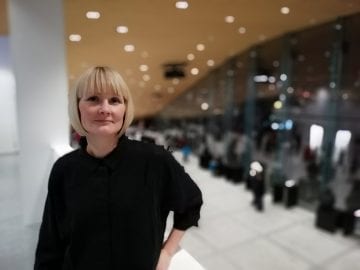Towards a “green” future of the Baltic Sea

Karoliina A. Koho,
Dr., Project Officer,
BONUS Secretariat (EEIG),
Helsinki, Finland
Although the COVID-19 pandemic is eminently going to leave a mark on the world’s economy, it also provides us with an opportunity: a “clean slate”, to do better and change our approach towards the management of the environment and preserving global biodiversity. Here, Europe is intending to set a positive example to the world and lead the way towards healthier and more resilient ecosystems, while minimizing the impacts of climate change and decarbonizing our societies by 2050. The new policy initiative, European Green Deal, is aimed at all sectors alike, with no person or place left behind, and everyone’s efforts are needed to achieve a sustainable tomorrow.
Many solutions for the greener future have a high affinity to the growing sector of Blue Economy, which in the Baltic Sea alone has increased in value from 29.7 billion euro to 34.1 billion euro in less than a decade. In future, this sector is likely to expand further. However, to ensure Blue Economy is truly developed with sustainability of marine ecosystem goods and services in mind, major research and innovation breakthroughs are needed.
During the last decade, the joint Baltic Sea Research and Development Programme known as BONUS (Treaty on the Functioning of the European Union Article 185 activity) has invested over 100M euros to support the development of ecosystem-based management of the Baltic Sea region, providing policy relevant solutions to current issues facing the marine environment. Now, a new Baltic and North Sea Research and Innovation Programme (BANOS), coordinated by the BONUS Secretariat, is being developed by means of an EU funded Coordination and Support Action, BANOS CSA. In future, BANOS aims to build on the BONUS legacy and success, unlocking the development of sustainable Blue Economy in northern European marine areas. The two ‘sister seas’, the Baltic Sea and the North Sea, have much in common and constitute a key macroregion of the European marine environment – making this an opportunity too good to miss. Many of the sustainability and climate related challenges are shared, plus the geopolitical and cultural setting is ripe for collaboration, hence pooling of resources and research and innovation capacities for the added benefit of both regions is considered highly desirable.
To support the ambitious goals of the European Green Deal, the next European Framework Programme Horizon Europe (2021-2027) is also aiming to deliver high impact solutions in research and innovation. A new element in Horizon Europe is the European Partnerships, bringing together the European Commission, private and/or public partners to address some of Europe’s most pressing challenges through concerted research and innovation initiatives. For the Blue Economy sector, the partnership candidate Climate neutral sustainable blue economy is the most relevant, however others focusing on preserving biodiversity, decarbonizing waterborne transport, developing the energy sector and protecting freshwater environment are also highly topical.
During the last year BANOS CSA has been closely following and contributing to the development of the sustainable blue economy partnership. The BANOS Strategic Research and Innovation Agenda (SRIA), due to be launched in May 2021, together with SRIAs developed in other European regional sea areas, are laying the solid foundations for the agenda of the partnership. As the emerging joint SRIA indicates, many of the sustainability challenges facing the Blue Economy sector can be considered Pan-European, or even global in nature, however, the solutions for the problems are likely to be more localized, taking into account the nature of marine ecosystems, the people who depend upon them, and the local climate. In this respect, macroregionalized actions such as BANOS deliver appropriate solutions for the Baltic Sea and its unique ecosystems and biodiversity, which remain highly vulnerable to environmental stressors. Hence, the macroregional level should not be overlooked in the implementation of the Pan-European research and innovation agendas. Indeed, many marine governance issues continue to be better resolved through existing macroregional structures, with HELCOM being the governing body of the Convention on the Protection of the Marine Environment of the Baltic Sea Area.
The implementation of the sustainable blue economy partnership and BANOS agendas and priorities of research and innovation topics are still largely open. To ensure that the priorities of a “green” Baltic Sea are comprehensively addressed, a macroregional focused research and innovation programme is likely to be necessary to complement the Pan-European activities. Such a programme in the form of BANOS, following the footsteps of BONUS, would deliver high level sustainable Blue Economy solutions in the best interests of the Baltic region.
Email: karoliina.koho@bonuseeig.fi
Expert article 2860
> Back to Baltic Rim Economies 1/2021
To receive the Baltic Rim Economies review free of charge, you may register to the mailing list.
The review is published 4-6 times a year.
